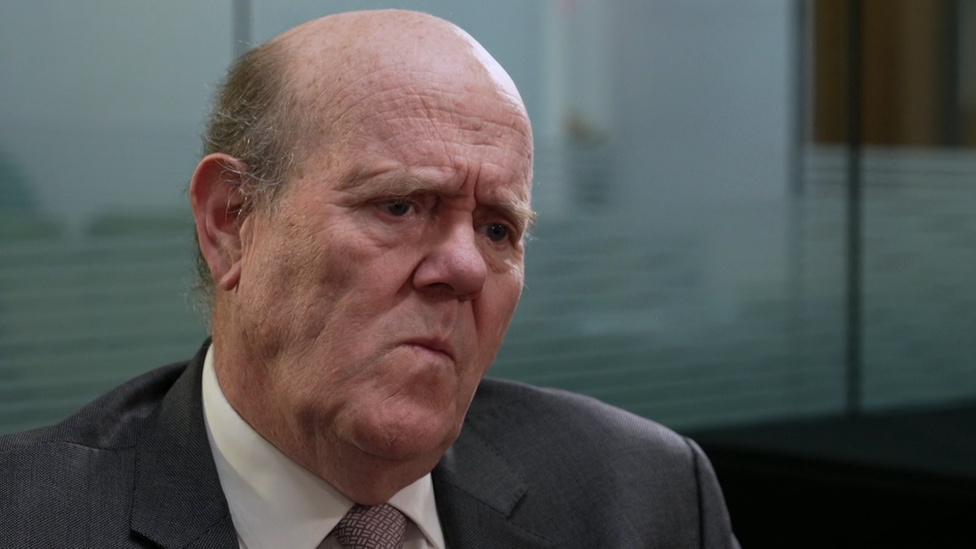Sexism in City still 'shocking', report finds
- Published

Women working in London's financial district are still routinely subjected to "shocking" levels of sexual harassment and bullying, a report by MPs has found.
Efforts to tackle sexism in the City is moving at a "snail's pace" and requires action, the Treasury Committee said.
It called for an end to the "era of impunity" which it said was "holding back women" in their careers.
Employers and government had a role to play, it said.
The group of MPs said while there had been "incremental improvements" since 2018 - such as a small increase in the representation of women in senior roles and a slight reduction in the sector's average gender pay gap - progress had still been far too slow.
Gender equality campaigner Baroness Helena Morrissey, who gave evidence to the committee, said she believed "shining a light" on the problem would spur more urgency. She worked in financial services for more than 30 years and now chairs the Diversity Project, which aims to change gender balance in the investment industry.
"Our efforts have been well-intentioned but they have often been off target," she told the BBC's Wake up To Money programme.
Legislation and the "rapping of knuckles" was not enough and change needed to come from within the industry and "involve men" more, she added.
The report, published to coincide with International Women's Day, comes against a backdrop of last year's allegations of rape and sexual assault within the CBI business group and against high-profile fund manager Crispin Odey.
"The shocking thing is people just seemed to stand by and that's obviously not good enough," Baroness Morrissey said.
Harriett Baldwin, chair of the committee, said the UK's financial services sector was the "crown jewel" in the country's economy "admired by the international community".
But she said it would only be able to maintain its position if it was able to draw on the "widest possible pool of talent". "That's why it's so frustrating that efforts to tackle sexism in the city are moving at a snail's pace," she added.
One of the committee's key criticisms was around the use of non-disclosure agreements (NDAs) in sexual harassment cases.
During an inquiry, MPs heard how NDAs were misused to "cover up" abuse, sexual harassment and discrimination, "leaving victims silenced while perpetrators go unpunished".
The committee called for legislation to ban the use of NDAs and stronger protections for whistleblowers in sexual harassment cases.
The MPs said firms' internal whistleblowing procedures were "inadequate" and that HR teams prioritised the reputation of a business over the wellbeing of its employees.
The committee said evidence showed that 70% of whistleblowers within financial services were "victimised, dismissed or felt resignation was the only option open to them".
To create a more level playing field for women, it called for a ban on prospective employers asking for salary history and a legal requirement for job adverts to include salary bands.
Other measures could include adjusting the size threshold for gender pay gap reporting - currently only firms with more than 250 staff are obliged to disclose their gender pay gap - and requiring businesses with wide gender pay gaps to explain the disparity and publish an action plan.
Ms Baldwin said regulators and the government should avoid introducing "tick-box" exercises and needed to take responsibility for "improving their culture".
Frances Coppola, an independent market commentator, said during her previous career in the City, where she worked in finance and risk management for several of the big banks, including RBS, NatWest and Midland (now HSBC), the "work hard, play hard" culture had made it harder for women with children to progress.
"At the more senior levels it was almost exclusively men, who were married and had families and had non-working wives, so for me, as a senior woman, I was a rarity," she told Wake Up To Money.
"There was this expectation that I had somebody at home who could pick up the kids and do everything for me."
It was in firms' best interest to tackle the lack of gender balance and career mobility for women Baroness Morrissey added, with the data suggesting teams with a better mix performed better.
"They could never prove causality but there is a lot of empirical evidence being collected about how more diverse teams are more innovative," she said.
Related topics
- Published7 February 2024

- Published15 March 2018
